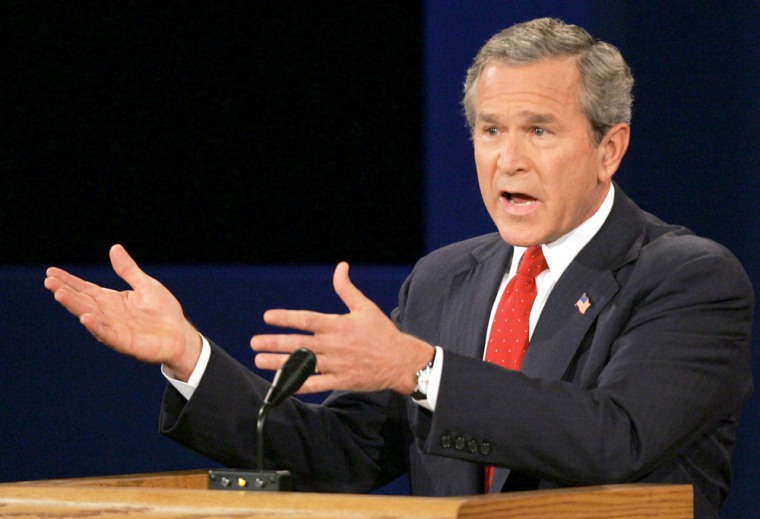With John Kerry enjoying momentum in the polls and President Bush not scoring a knockout in their final debate, it's up to the president to figure out how to knock Kerry off his pace in a way that he's not yet done between now and Nov. 2.
The final Bush-Kerry face-off opened with all the potential to shift the race decisively from one candidate to the other. It probably did not do so.
Kerry’s strongest suit once again was his deployment of specific facts and details that seemed to substantiate his general arguments, even though Kerry sometimes recycled talking points that have already been discredited.
For example, Kerry trotted out this: that new jobs being created pay $9,000 a year less than those they replace.
As the independent group Factcheck.org has said, Kerry bases that assertion on disputed analysis from a labor union funded think-tank, the Economic Policy Institute.
“In fact, economists disagree about whether jobs are getting worse or better,” said Factcheck.org. “There’s evidence both ways. Even some Democratic economists say the economic numbers are simply too rough and contradictory to allow any conclusion about the direction of change, let alone about how much less or more the new jobs pay.”
Bush speaks of his faith
Bush’s most effective moment was when he answered a question about his religious faith, probably because he was speaking from the heart. His answer seemed more authentic than Kerry telling the national TV audience — for the second debate in a row — that he had once served as an altar boy.
Kerry’s chief strategist, Bob Shrum, was crowing in the post debate spin room, arguing that Kerry had proven that he was equal to the job of commander in chief.
“What John Kerry has achieved in these debates is a sense of stature, of being presidential and also a sense of being a very likeable human being. That kind of combination is very powerful,” Shrum told reporters.
Shrum insisted that Kerry had dealt with the details of the minimum wage and equal pay for women, and that Bush had not.
He said that Kerry “will bring allies to our side,” a linchpin of Kerry’s pitch to voters that he could do better in handling Iraq than Bush has done.
That argument, of course, continues to hinge on a hope and an unprovable assertion. Some “allies” have made it clear they will not chip in troops to the Iraq pacification project.
Missed opportunity
Perhaps the biggest missed opportunity for Bush was not specifying — and reinforcing through repetition — his statement to Kerry early in the debate that “there's a main stream in American politics and you sit right on the far left bank.”
Bush mentioned Kerry’s vote against the 1990 congressional authoriziation to repel Saddam Hussein from Kuwait and against the 1996 Defense of Marriage Act, signed into law by President Clinton, which established that no state would be required to recognize same-sex marriages performed in other states.
But Bush never really explained what was at stake in the Defense of Marriage Act, and why Kerry’s vote on it, which he has since edged away from, puts him at odds with most Americans.
I asked Shrum whether he was surprised that the Bush team had not more energetically pinned down Kerry on those votes and similar ones. Seeming happy that Bush had not done so, Shrum began to say he didn’t think people cared, but then said, “I think people have asked the larger question: Is John Kerry the kind of leader who will stand up and fight for and defend this country? Their answer is yes. To go back to one specific vote a long time ago is not what people are judging on.”
Shrum added that marriage issue pales into insignificance because “the economy is in terrible trouble” and Americans are upset about the rising cost of health insurance.
Soft-ball questions
Kerry clearly benefited from the choice of the moderator: CBS News host Bob Schieffer served up two very fat softball questions that allowed Kerry to launch into a portion of his campaign stump speech.
One was Schieffer’s question on the gap between rich and poor growing wider, an idea that ignores the reality that middle-class American family incomes are rising.
The other was when Schieffer lamented that a sense of national unity that existed after Sept. 11, 2001, seemed to have “melted away” and asked Kerry how he’d repair the supposed breach.
This too was an hors d’oeuvre for Kerry’s stump speech blaming Bush for allegedly dividing Americans.
What made Kerry’s answer all the more a study in impudence was that he used it to say he would “work with my friend John McCain … so we get these incredible amounts of money out of the system” through more campaign finance laws.
That was a very big missed opportunity for Bush to say: “What about your supporter George Soros? Spending $13 million to elect you? Peter Lewis of Progressive Insurance spending $14 million? And you want us to believe you really want to get these incredible amounts of money out of the political system?”
Mark McKinnon, Bush’s media adviser, said after the debate that “on some of the values issues tonight the president was really reasonable. The people who disagree with him on these issues looked at him tonight and said, ‘this is pretty reasonable. He’s not antagonistic about it. He’s not threatening about it.’”
But whether Bush had convinced a majority of voters that Kerry was unreasonable on same-sex marriage and abortion was still unknown.
